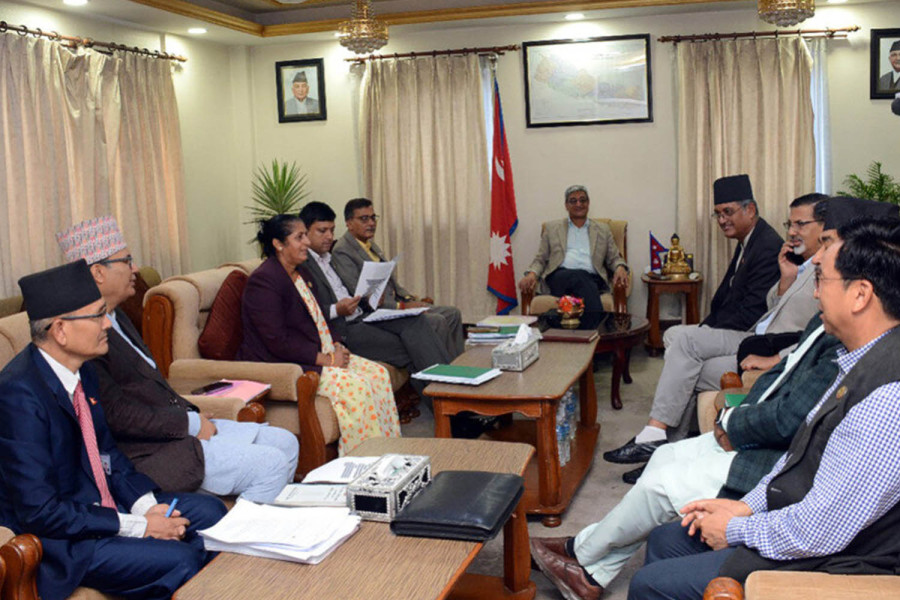National
3 parties confirm deal on transitional justice bill revision
Victims remain divided as some object to reduced sentencing and call it a bid to protect the perpetrators.
Binod Ghimire
The major parties’ years-long differences over the amendment to the Enforced Disappearances Enquiry, Truth and Reconciliation Commission Act have ended, with them now agreeing on the content of an amendment bill.
The three-party panel formed to iron out the differences over the bill forged consensus on the contentious issues on Thursday, clearing the deck for its endorsement by the federal parliament. The taskforce, comprising Ramesh Lekhak of the Nepali Congress, Mahesh Bartaula of the CPN-UML, and Janardan Sharma of the CPN (Maoist Centre), was formed on July 1 after the Law, Justice and Human Rights Committee of the House of Representatives failed to forge on agreement on the bill, mainly over four issues.
After a month-long discussion, the panel managed to find consensus on all the issues. There has been an agreement to list intentional and arbitrary killings as serious violations of human rights and to reduce the sentence of the guilty in serious violations of human rights by 75 percent. A victim who is unwilling to reconcile can move the court against the perpetrators.
All the disqualified Maoist combatants including child soldiers, along with the families of security personnel who lost their lives or were injured during the insurgency, will get reparation and compensation, as per the agreement.
“All the contentious issues have been resolved. Today’s [Thursday] agreement has paved the way for the conclusion of the transitional justice process,” said Bartaula, claiming the agreement had kept the victims at centre. The three-party representatives will jointly present their report to their top leaders. The Law, Justice and Human Rights Committee will then endorse the bill by incorporating the agreed points and forward it to the House. After this, the bill must be endorsed by both the chambers of the federal parliament to come into effect.
The panel members claim that the door has opened to deliver justice to the victims of the 1996-2006 insurgency who have had to wait for it for around two decades. “An important agreement has been forged today [Thursday]. Our transitional justice process will be established as a successful model globally,” said the Maoist Centre’s Sharma.
But conflict victims have expressed their reservations on some of the provisions the mechanism has agreed on.
Gopal Shah, chairperson of the Conflict Victims’ National Network, termed the agreement a “sugar-coated poison”.
“The wording looks good, but it cannot deliver justice to the victims. Reduced sentencing aims to provide amnesty to the guilty after symbolic action,” he said. “The parties don’t want proper legal action for serious violations of human rights.”
Shah said the transitional justice process cannot be complete without providing justice to former Maoist child soldiers.
The panel has agreed not to include minor child soldiers in the bill as the Maoist Centre would strongly oppose any such inclusion. Among the 4,008 Maoist combatants who did not qualify for integration into the Nepal Army, 2,973 were verified as minors by a United Nations mission. They are yet to get substantial support, except for a few thousand rupees given by the UN while they were discharged.
Human rights activists also see several lapses in the agreed provisions. Charan Prasai, a human rights defender, said the agreement is guided by the larger goal of shielding perpetrators.
“A political agreement alone is useless unless the victims have faith in the process. The current agreement only protects the perpetrators,” he said. The transitional justice process cannot be completed without addressing crimes against humanity and war crimes, according to Prasai.
Neither the existing Act nor the amendment bill mentions these crimes. The former warring parties—the Maoists and the state security forces—maintain that no acts of crime against humanity and war crimes ever happened in Nepal.
Not all stakeholders are opposed to the agreement though. A section of the victims has welcomed the deal claiming that there was some hope for justice after a long time.
Ram Bhandari, a rights activist whose father was forcibly disappeared by the state security forces, welcomed the agreement and said the focus should now be towards ensuring that the transitional justice commissions get the right leadership.
The Truth and Reconciliation Commission and the Commission of Investigation on Enforced Disappeared Persons have been paralysed for over two years in absence of chairpersons and members. Their appointment process will commence with the Act’s endorsement.
“We now want organisational representation of victims in the reparation mechanism,” said Bhandari. He claimed that the transitional justice process has been delayed as more focus was given to criminal prosecution while ignoring other pillars of the process.
“We hope the long pending task of transitional justice will be expedited and the victims will get reparations while other processes take their course,” Bhandari said.
In its verdict on a writ petition jointly filed by dozens of conflict victims, the Supreme Court in February 2015 had turned down several provisions in the Act as they allowed amnesties in serious violations of human rights. Nine years after the ruling, the Act is yet to be amended despite several attempts to do so.
The leaders in the three-party task force say the Act will be amended in the ongoing session of Parliament, marking the resumption of the long stalled transitional justice process. “We are confident that the transitional justice process will be completed in the next four years by ensuring justice to all the victims,” said Bartaula.
Records show that as many as 3,223 complaints of enforced disappearances implicating either security forces or the Maoists have been lodged at the Disappearances Commission. It has picked for investigation 2,494 cases falling under its jurisdiction. Similarly, 63,718 complaints have been registered with the Truth Commission.




 13.12°C Kathmandu
13.12°C Kathmandu














